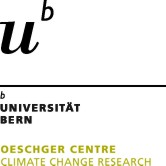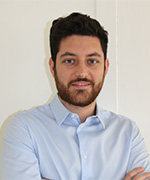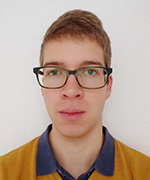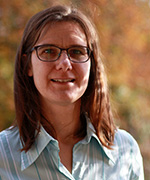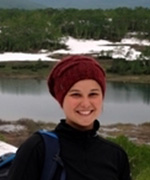December 2019
General News
- A Swiss Stonehenge
- International Universities Climate Change Consortium
- Successful strategy talks with the University Board of Directors
- EXPLO extensively featured by Spiegel online
- New research project on coordination in climate policymaking
- Mobiliar Lab Newsletter
- Birch tar reveals age of Bronze Age find
- New ProClim Flash is out
- New OCCR presentation guideline
Events
- OCCR Plenary Meeting on 13 February 2020
- Virtual Alpine Observatory meets in Bern
- Young Researchers Meeting 2020
- Event on pioneering work on hail
- Comparing Climate Change Policy Networks met in Bern
- Swiss Climate Summer School 2020 on extreme weather and climate
People
- Andreas Zischg promoted to Assistant Professor
- Genetic diversity of Swiss mountain forests
- Theodor Kocher Prize for Thomas Frölicher
- Michael Sigl part of the Royal Society of Chemistry’s educational program
- Caroline Heitz wins thesis of the year award
- Joe McConnell, Desert Research Institute, Reno visits CEP
- Sandra Brügger receives Prix de Quervain
- Heli Huhtamaa awarded Prize for the Humanities
- Michael Sigl hosts workshop on volcanic impacts on climate and societies
- Researchers who have recently joined the OCCR
- Researchers who have recently left the OCCR
Publications
General News
A Swiss Stonehenge

The OCCR’s Laboratory for the Analysis of Radiocarbon with AMS (LARA) and its Quaternary Geology and Paleoclimatology group are part of an interdisciplinary research project that was initiated by the Archeological Survey of the Canton of Thurgau.
The project was started in 2015, after a Neolithic structure with over 170 mounds was detected in Lake Constance by a high-resolution bathymetric survey.
This finding triggered large interest in many disciplines as well as public debates. In order to determine the age of the discovered mounds, the OCCR team recovered a series of up to 6 m deep drill cores. They provide a sedimentologic archive, spanning from the last glaciation 18'000 years ago to today. The sedimentology, stratigraphy and paleoenvironmental significance of these cores are now beeing investigated. A first radiocarbon analysis has revealed an age of the mounds of approximately 5'500 years before present, placing them in the Neolithic epoch. Future investigations will refine the knowledge of origin and purpose of this aligned mounds that form one of the largest Neolithic structures worldwide.
Watch a TV documentary on the project (in German).
International Universities Climate Change Consortium
The University of Bern has decided to join a new initiative called International Universities Climate Change Consortium (IUC3) that was launched by the University of New South Wales, Sydney. IUC3 intends to form a group of around 50 leading universities, representing all regions of the world, to provide a strong and respected international voice on matters related to climate change science, impacts, mitigation and adaptation. The future role of IUC3 should be to engage with policymakers on international climate agreements, analyse reports and statements to synthesise and disseminate the latest science, and deliver clear communications on carbon mitigation, renewables, local and international climate solutions and climate change adaptation.
Successful strategy talks with the University Board of Directors
On a regular basis, the management of the OCCR meets the University Board of Directors for strategy talks. The outcome of these recent talks was very positive – according to the Board, the OCCR has met all its goals, which are included in its performance mandate, and it continuously makes progresses in its performance.
EXPLO extensively featured by Spiegel online
The leading German news magazine Der Spiegel reports on EXPLO (Exploring the dynamics and causes of prehistoric land use change in the cradle of European farming) in its online edition. The magazine covers field work on Lake Ohrid in North Macedonia in a long read as well as in a video. EXPLO is an interdisciplinary project initiated by Alfred Hafner (Prehistory Archeology group) and Willy Tinner (Palaeoecology group). It was awarded an “ERC Synergy Grant” and is supported by the EU with €6.4 million.

New research project on coordination in climate policymaking
Karin Ingold (Policy Analysis and Environmental Governance group) has been granted SNFS funding for a project entitled “Same, same but different? Multiplex networks in Swiss and German Climate Mitigation Policy. ”The project will finance a PostDoc position over the next three years and a Ph.D. position over the next four years. The research proposal reads: ”The first contribution of this project is to evaluate the conditions under which actors involved in climate policymaking start coordinating their actions. The second contribution is of practical relevance. Climate policymaking is rather an example of policy failure than of policy success. This holds true already for the policy design, when only second-best options can gain enough support by the political elite. We give more evidence about how a joint problem understanding or how bringing diverse stakeholders around one table might enhance climate policy coordination at the domestic level“.
Mobiliar Lab Newsletter
The Mobiliar Lab for Natural Risks has just published the latest issue of its biannual newsletter (in German). Topics featured include: new approach to heavy precipitations scenarios, climate change and flood protection and how to combine global climate models and damages functions for single houses.
Birch tar reveals age of Bronze Age find
The LARA radiocarbon dating laboratory at OCCR is a leading tool when it comes to analysing small material samples. This know-how was also in demand for dating the bronze hand of Prêles, a find that has made international headlines. The laboratory is equipped with highly specialised technology that makes it possible to carry out 14C age determinations using even tiny material samples. For example, when OCCR researchers need age data about the individual layers of lake sediments used as climate and environmental archives, samples of just a few milligrams – or sometimes even smaller – must suffice. In the case of the Prêles find, the 14C laboratory also dated bone finds – a big challenge from a methodological and technical point of view. Over the last years, LARA has refined a method that uses ultrafiltration to prepare bone samples.
Read the full story.


The latest edition of ProClim Flash, the Swiss magazine on climate and global change, has just been published. As usually, it contains a double page on the OCCR. ProClim is a forum of the Swiss Acdemy of Sciences and serves as an interface for communication between science, public administration, politics, economy and the public. Register for the ProClim network or subscribe to the different ProClim publications.
New OCCR presentation guideline
A new guideline for power point presentations in line with the OCCR’s corporate design is now available. The previous design should no longer be used. Please, use it for new presentations and adapt existing presentations over time.
Events
OCCR Plenary Meeting on 13 February 2020
The next OCCR Plenary Meeting will take place on Thursday, 13 February 2020 (14 – 17 h), at the Exact Sciences building (Sidlerstrasse 5) room 099 (ground floor). Detailed information on the program will follow.
Virtual Alpine Observatory meets in Bern
The Virtual Alpine Observatory (VAO) Symposium, sponsored by the OCCR, will take place at the University of Bern from 2 to 4 February 2020. Deadline for the registration is 5 January 2020.
Young Researchers Meeting 2020
The OCCR Young Researchers Meeting 2020 takes place - as in previous years - in Aeschi bei Spiez on 4 and 5 June. The meeting is open to young climate researchers based in Switzerland. Save the date; the program and registration procedure will follow in due time.
Event on pioneering work on hail
On 13 November 2019, the OCCR’s Mobiliar Lab for Natural Risks organized a public event on hail in Switzerland. The get-together on pioneering work in the field of hail took place at the Alpine Museum in Bern and included lectures by OCCR members Olivia Romppainen and Hélène Barras as well as representatives from MeteoSwiss, Mobiliar Versicherungsgesellschaft and Vereinigung Kantonaler Gebäudeversicherungen (VKG). The different talks were met with large interest from the public that included practitioners working in private engineering firms and public administration.
Have look at the talks (in German).
Comparing Climate Change Policy Networks met in Bern

On 22 – 25 October 2019, the OCCR’s Policy Analysis and Environmental Governance group organized a workshop of the Comparing Climate Change Policy Networks (COMPON) in Bern. The COMPON project is an international endeavor, which exists since 2007. It focuses on different national social and policy responses to mitigate climate change in more than 20 cases.
National project teams regularly meet to discuss results in workshops. This year, 29 researchers form all career levels participated in the workshop hosted by the OCCR. The four-day event was packed with interesting presentations (e.g. a keynote by Liliana Andonova, the Co-Director of the Centre for International Environment Studies (CIES) in Geneva) and hands-on workshop sessions. Among other, the work progress of the different teams was discussed, new ideas and best practices were exchanged and the current data collection coordinated. The workshop consolidated new collaborations between COMPON researchers, and it presented an ideal occasion to get to know new members of the networks from around the world.
Swiss Climate Summer School 2020 on extreme weather and climate
The Swiss Climate Summer School 2020 takes place on 23 - 28 August 2020, Grindelwald, Switzerland. It focuses on the theme “Extreme weather and climate: from atmospheric processes to impacts on ecosystems and society”. This theme has been chosen due to its paramount importance in terms of both scientific challenges and pressing societal concerns. Always with a focus on extreme weather and climate, the specific topics include: The atmospheric perspective and the impacts perspective, Atmospheric processes and statistical concepts, Impacts of extreme events on humans, ecosystems, and society. Don’t forget do apply! The deadline is 10 January 2020.
People
Andreas Zischg promoted to Assistant Professor
Andreas Zischg (Mobiliar Group for Climate Impact Research) has been promoted to Assistant Professor (non-tenure-track).
Genetic diversity of Swiss mountain forests
Christoph Schwörer (Palaeoecology group) is building up his own research group on Paleoecology - Population Dynamics. He is able to do so thanks to an SNFS grant of CHF 443’000 he has been awarded for a project called “Tracking Holocene genetic diversity of Swiss mountain forests using ancient DNA”. Earlier this year, he had already been awarded a substantial grant by the Swiss Federal Institute for Forest, Snow and Landscape Research (WSL). The project summary of his new project reads: “To study past climate-driven range shifts and their effects on genetic diversity and the adaptive potential of trees, I propose a novel, holistic approach that combines established palaeoecological methods with the analysis of ancient DNA (aDNA) and dynamic vegetation modelling.”
Theodor Kocher Prize for Thomas Frölicher

Thomas Frölicher (Ocean Modelling group) was awarded the Theodor Kocher Prize by the University of Bern. The prize, which is an award of CHF 50,000, is conferred on young researchers at the University of Bern for outstanding and innovative scientific achievement in any faculty or field. It is traditionally handed over at the University of Bern’s Dies academicus which took place on 7 December.
Michael Sigl part of the Royal Society of Chemistry’s educational program
Michael Sigl (Past Volcanism and Climate Impact group) was interviewed for the education website Royal Society of Chemistry (“We support teachers to inspire future generations of scientists around the world article”). The article "Frozen in time", in which Michael is quoted, shows the lengths scientists go to for their research and was specially written for students. The note for teachers reads: “Environmental issues including climate change now have a high profile in the mainstream media, presenting students with a wide range of commentary and opinion. This should make atmospheric chemistry an easy subject to teach, yet it can seem dry and theoretical when presented in the curriculum context. This article helps students to see how scientists are collecting data that is providing evidence for atmospheric changes in the past, a long time before scientific records began.”
Caroline Heitz wins thesis of the year award
Caroline Heitz (Prehistory Archeology group) has been rewarded for her PhD-thesis by the Faculty of Humanities of the University of Bern. She won the thesis of the year award of 10’000 CHF. Her work is part of the SNFS project “Mobilities, entanglements and transformations in Neolithic societies on the Swiss Plateau (3900-3500 BC)”.
Joe McConnell, Desert Research Institute, Reno visits CEP
Joe McConnell from the Desert Research Institute, Reno (USA) will visit the Climate and Environmental Physics (CEP) at the University of Bern. Joe McConnell is a Research Professor and operates the Ultra-Trace Chemistry Laboratory in Reno, specialised in in the development and application of leading-edge technologies for the analysis of polar and alpine ice cores. He has been working on ice cores from Greenland, Antarctica, Alaska and the French Alps. His research interests include human pollution, radiative forcing from natural and anthropogenic aerosol emissions (fires, mineral dust, volcanoes) in the past and present. He is collaborating with Michael Sigl (Past volcanism and climate impact group) within the ERC THERA Project on extending ice-core based reconstructions of volcanic climate forcing back in the last Glacial.
Sandra Brügger receives Prix de Quervain
Sandra Brügger (Paleoecology group) has been honoured with the de Quervain award presented by the Swiss Committee on Polar and High Altitude Research. The “Prix de Quervain” for Polar and High Altitude Research is attributed to young scientists for outstanding achievements in their MA or PhD thesis or other research projects. The "Prix de Quervain" is announced annually, alternately for research activities related to polar regions or high altitude research. At a symposium on 7 November 2019 she presented her outstanding work in a talk entitled “FrozenNature – The palynological contribution to reconstruct paleo fire, vegetation, land use, and pollution dynamics from high-alpine ice cores”.
Heli Huhtamaa awarded Prize for the Humanities

Heli Huhtamaa (Environmental History and Historical Climatology group) was awarded the “Prize for the Humanities” by the Finnish Academy of Science and Letters. The prize of 15 000 EUR is awarded to a scholar of humanistic sciences in the beginning of their career, who has already earned international renown.
Heli conducts research on the historical societal impacts of climate, especially focusing on the Arctic and subarctic regions. She was acknowledged by the Board of the Academy of her holistic approach and her innovative research methods. Heli is currently a SNFS early postdoc mobility fellow at the Heidelberg University and will return to the Environmental History and Historical Climatology group in spring 2020 on an Advanced PostDoc position funded by the OCCR.
Michael Sigl hosts workshop on volcanic impacts on climate and societies
Michael Sigl (Past volcanism and climate impact group) is one of the hosts of an international workshop entitled “Impacts of large volcanic eruptions on climate and societies: proxies, models and solutions for the future”. It takes place on 17 - 21 March 2020 in Riederalp, Switzerland. Registration is by invitation only. The aim of the workshop is bringing together a small group of 30-35 key scientists working in the fields of large volcanic eruptions, climate impacts, event modeling and consequences for societies to discuss big remaining challenges and jointly work on solutions. The workshop will specifically tackle questions related to the dating and the documentation of past eruptions with different proxy sources. Moreover, the modeling of past eruptions will be discussed as well as the spatial and temporal consequences of large eruptions on climate and weather extremes. An additional topic will be the impacts of such events on socio-economic processes, production and trade.
Researchers who have recently joined the OCCR:
|
|
Alessio Ciullo is a new PostDoc with the Mobiliar Group for Climate Impact Research. He did a Master’s Degree in Environmental Engineering at the University of Bologna. At his new position he is part of the RECEIPT (Remote Climate Effects and their Impact on European sustainability, Policy and Trade) H202 project. |
|
|
Markus Grimmer is a new PhD with the Past Climate and Biogeochemical Studies on Ice Cores group. He did a Master in Climate Sciences at the Universtiy of Bern with a thesis entitled “The meteorological diaries of Johann Rudolf von Salis-Marschlins, 1781-1800”. His research focus lies on the reconstruction of the mean ocean temperature on the basis of noble gas isotopes in ice cores. Thereby, he will have to constrain the air mixing and fractionation processes occurring in the firn column. The working title of Markus’ PhD thesis is: "Noble gas ratios in polar ice cores as a proxy to infer the mean ocean temperature over the last 700 ka". |
|
|
Sonja Paul is a new scientific staff member with the Climate and Agriculture group. She gained her PhD at the Georg-August Universität Göttingen, Germany with a thesis entitled “Biologische Diversität und Ökologie”. |
|
|
Giulia Wienhues is a new PhD with the Lake Sediments and Paleolimnology group, where she already did her Master thesis entitled "Multi-proxy reconstruction of Holocene environmental change from sediments of Lake Rzęśniki, Northeast Poland". Her research focus is on paleoclimatology and paleoecology using sediment records of Lake Victoria. |
A warm welcome to all of you!
Researchers who have recently left the OCCR:
Elke Kellner, who was a PhD with the Hydrology group is now a PostDoc at the Swiss Federal Institute for Forest, Snow and Landscape Research (WSL) in the group of Economics and Social Sciences. She works on the governance processes in order to coordinate competing resource uses under climate change. In particular on water reservoirs for alleviating water shortages.
All the best for your future career!
Recent journal publications by OCCR members
See all the publications by OCCR members.
